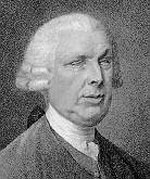John Stanley was born on 17 January 1712, the eldest surviving child of John and Elizabeth Stanley of the London parish of St Swithin, London Stone. At the age of two he was supposedly blinded by a domestic accident involving a broken china basin; an engraving of a lost portrait of him in middle age by Thomas Gainsborough shows him with shrivelled eye-sockets, but it is possible that he retained some residual sight since he became a prolific composer and was evidently able to pursue an active concert career, often directing extended works by his contemporaries such as Handel’s
Messiah.
Stanley came early to public attention as an organist. After studies with John Reading and Maurice Greene he obtained posts successively at All Hallows, Bread Street (1723), St Andrew, Holborn (1726) and the Temple Church (1734). In 1738 he achieved a measure of financial security by marrying the daughter of a member of the East India Company who brought him a dowry of seven thousand pounds. Soon after, he began to establish himself as a composer with a series of publications spread across most of the fashionable genres of the day. His Op 1, a set of solos for flute or violin and continuo, appeared in 1740; it was followed two years later by the six Op 2 concertos and by a set of English cantatas (Op 3), the words mostly by the future music historian John Hawkins. In later life Stanley became Handel’s successor as the director of the Lenten oratorio seasons at Covent Garden (later Drury Lane) and as the leading musician at the Foundling Hospital. In 1779 he also succeeded William Boyce as Master of the King’s Musick, and was responsible for composing court New Year and Birthday odes (all of which, unfortunately, are lost) until his death in May 1786.
from notes by Peter Holman © 1989
Né le 17 janvier 1712, John Stanley était l’aîné des enfants survivants de John et Elizabeth Stanley, de la paroisse londonienne de St Swithin (London Stone). Quand il eut deux ans, un accident domestique, avec une jatte en porcelaine qui se serait brisée, l’aurait rendu aveugle; sur une gravure d’un portrait perdu réalisé par Thomas Gainsborough, nous le découvrons, la cinquantaine, les orbites racornies mais avec, peut-être, une vision résiduelle car il fut un compositeur prolifique et put, à l’évidence, mener une carrière active, se retrouvant souvent à diriger de vastes œuvres de ses contemporains, tel le
Messie de Haendel.
Ce fut en tant qu’organiste que Stanley attira d’abord l’attention du public. Après avoir étudié avec John Reading et Maurice Greene, il obtint successivement des postes à All Hallows, Bread Street (1723), à St Andrew, Holborn (1726) et à la Temple Church (1734). En 1738, il s’assura une certaine sécurité financière en épousant la fille d’un membre de l’East India Company, qui lui apporta une dot de sept mille livres. Peu après, il commença de s’établir comme compositeur avec une série de parutions embrassant la plupart des genres en vogue. Son op. 1, un corpus de solos pour flûte ou violon et continuo, parut en 1740, deux ans avant les six concertos op. 2 et une série de cantates anglaises (op. 3), sur des textes principalement dûs au futur historien de la musique John Hawkins. Plus tard, Stanley succéda à Haendel comme directeur des oratorios de Carême à Covent Garden (futur Drury Lane) et comme premier musicien au Foundling Hospital. En 1779, il succéda également à William Boyce comme Master of the King’s Musick et, jusqu’à sa mort en 1786, il lui revint de composer pour la cour les odes de Nouvel an et d’anniversaire (hélas toutes perdues).
extrait des notes rédigées par Peter Holman © 1989
Français: Hypérion
John Stanley wurde am 17. Januar 1712 geboren und war das älteste überlebende Kind von John und Elizabeth Stanley von der Londoner Gemeinde von St. Swithin im Stadtteil London Stone. Der Überlieferung zufolge erblindete er im Alter von zwei Jahren infolge eines häuslichen Unfalls mit einem zerbrochenen Porzellanbecken. Der Kupferstich nach einem verlorenen Ölportrait von Thomas Gainsborough stellt ihn in mittleren Jahren mit geschrumpften Augenhöhlen dar, doch möglicherweise blieb ihm etwas Sehkraft erhalten, denn er entwickelte sich zu einem fruchtbaren Komponisten, war allem Anschein nach zu einer aktiven Konzertkarriere befähigt und dirigierte umfangreiche Werke seiner Zeitgenossen wie zum Beispiel Händels
Messias.
Stanley machte sich schon in jungen Jahren einen Namen als Organist. Nach dem Studium bei John Reading und Maurice Greene hatte er nacheinander Organistenstellen an All Hallows in der Bread Street (1723), an St. Andrew in Holborn (1726) und an der Temple Church (1734) inne. 1738 erlangte er finanzielle Sicherheit durch die Heirat mit der Tochter eines Mitglieds der East India Company, die eine Mitgift von siebentausend Pfund mitbrachte. Schon bald darauf begann er, sich mit Kompositionen der meisten gängigen Genres seiner Zeit zu profilieren. Seine acht Soli für Flöte oder Geige und Generalbass op. 1 erschienen 1740; zwei Jahre später folgten der Satz von sechs Konzerten (op. 2) und ein Satz englischer Kantaten (op. 3), deren Texte überwiegend von dem späteren Musikhistoriker John Hawkins stammten. Im späteren Leben wurde Stanley der Nachfolger von Händel als Direktor der (erst in Covent Garden, dann in der Drury Lane aufgeführten) Oratorien für die Fastenzeit und als leitender Musiker am Foundling Hospital. 1779 wurde er auch Nachfolger von William Boyce als Meister der Königlichen Musikkapelle, und bis zu seinem Tod im Mai 1786 war er verantwortlich für die Komposition von Neujahrs- und Geburtstagsoden für den Hof.
aus dem Begleittext von Peter Holman © 1989
Deutsch: Henning Weber






